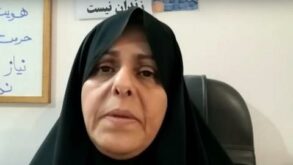Despite a deadly coronavirus epidemic, Iranian security forces and Judiciary continue the persecution of political dissidents, activists and critics as well as the ill-treatment of prisoners with great zeal.
A glance at social media platforms and even the highly censored Iranian media leaves no doubt that criticism of the establishment for its mismanagement of the coronavirus crisis, even from non-political citizens, is being harshly punished. The information on the extent of coronavirus crisis and its death toll is treated as a security matter and whistle-blowers who reveal information that brings the official accounts into question are very quickly and efficiently found and detained by security forces.
In the past week alone, several people were arrested for such criticism or revealing highly guarded information about the extent of the epidemic. Many Iranians believe that the death toll of the coronavirus is much higher than the official figures and say the real numbers and the extent of the crisis is being hidden from the public. Fingers are always pointed at the hardliner establishment that have constantly put up opposition to locking down infected cities, particularly the religious city of Qom.
On Thursday Mehdi Hajati, a former member of the City Council of Shiraz and human a rights defender, was arrested for criticizing mismanagement of the coronavirus situation. In a recent Twitter post he criticized the clerical establishment for opposing a quarantine for Qom and calling them “enemies of the nation”.
On the same day, the captain of Damash Soccer Team was arrested by security forces in his home Province of Gilan which is now one of hotspots of the coronavirus epidemic. The 36-year-old captain Mohammad Mokhtari had in an Instagram post questioned the official death toll. He had also said that in Gilan more than one hundred people die of the virus every day and bodies of the victims have to be buried in communal graves. Mokhtari criticized the Basij militia and clerics for their inaction at a time of crisis.
According to Human Rights Activists News Agency (HRANA) tens of ordinary citizens, including a whistle-blower nurse who had revealed the number of coronavirus patients in a Qom hospital have also been detained by security forces on charges of “spreading rumors”.
The regime has sent 70,000 prisoners home on furlough to prevent a coronavirus outbreak in prisons but very few of the political prisoners and prisoners of conscience have been released despite posing no danger to the society whatsoever.
Among them is Atena Daemi, a 32-year-old civil rights and children’s rights activist and a campaigner against capital punishment. She is serving a 14-year term for her activities in the notorious Evin Prison and despite poor health, the authorities have not allowed her to go on furlough.
Others such as Bahais, Christian converts and Dervishes who are serving prison terms on account of their faith and dual-citizens such as British-Iranian Nazanin Zaghari-Ratcliff and American-Iranian Siamak Namazi who are held as hostages are also among those the regime has refused to free or allow to go on furlough.
Prisoners kept in highly unsanitary conditions in prisons and facing the danger of contracting coronavirus in a closed environment also include thousands of protesters arrested during unrest in November and January. Many of them are even deprived of any contact with their families.
In a recent letter Soheil Arabi, a former blogger and winner of the Press Freedom Prize of Reporters Without Borders, wrote about the conditions of some of these protesters in the prison where he is serving his own sentence. Many of these protesters are kept with drug-traffickers, he wrote in his letter, and said infection by coronavirus and lack of proper medical facilities is a great risk to their lives.
Some of these prisoners such as Mohammad-Hossein Sepehri and Narges Mohammadi have even been punished for their dissidence and activism by banishment to prisons for dangerous inmates jailed for crimes such as homicide and drug-trafficking.
Sepehri is a teacher and in prison for participating in a teachers’ rally and “insulting the Supreme Leader”. He is now on hunger strike in Mashhad’s Vakilabad Prison.
Narges Mohammadi, a human rights activist and the winner of several prestigious awards including the Andrei Sakharov Prize for upholding human rights, has been sent to a provincial prison where her life has repeatedly been threatened by another inmate under the eyes of the prison authorities.
Sepideh Qolyan (Gholian), a twenty-four-year old labor activist who was freed on February 9 on a $43,000 bail bond on Thursday reported that she has to attend a hearing for suing a journalist of the state-run television. The said journalist, Ameneh Sadat Zabihpour, was among those responsible for the production of a so-called documentary in which Qolyan and other activists had to make self-incriminating “confessions” months before their trial for participation in peaceful protests. Her own lawsuit against the said journalist was dropped by the court.
- Maryam SinaieeMaryam Sinaiee is a British-Iranian journalist, political analyst and former correspondent of The National, who contributes to Radio Farda.
 Shabtabnews In this dark night, I have lost my way – Arise from a corner, oh you the star of guidance.
Shabtabnews In this dark night, I have lost my way – Arise from a corner, oh you the star of guidance.


